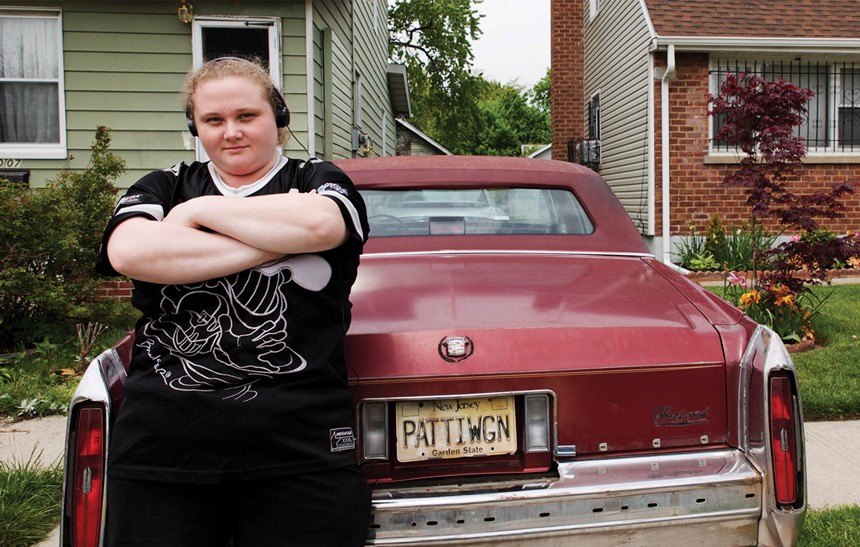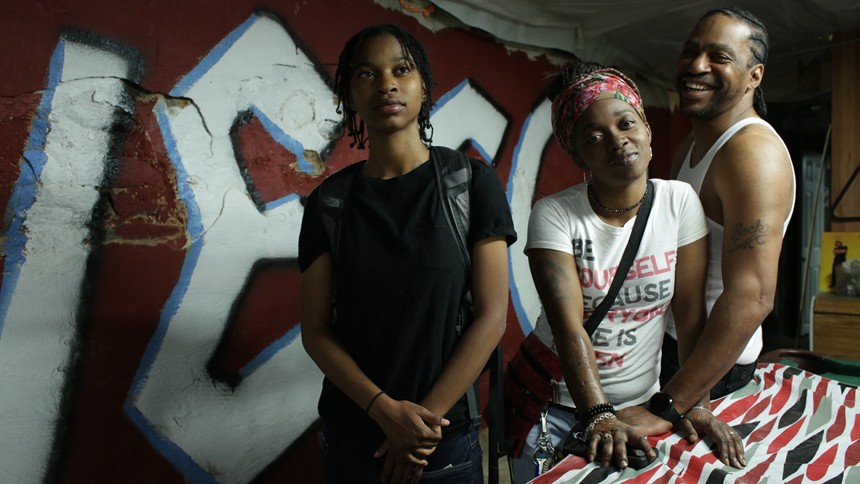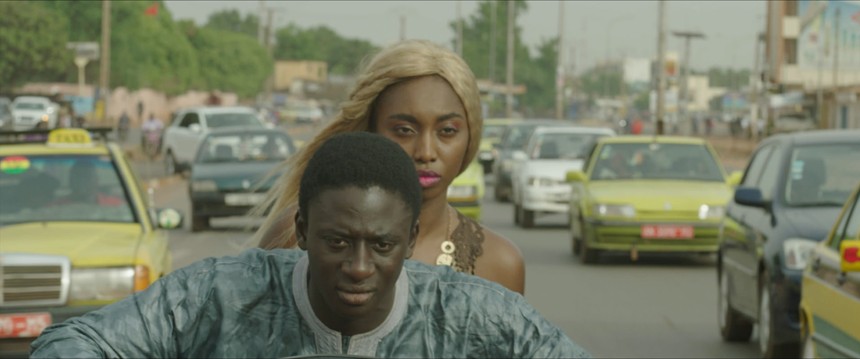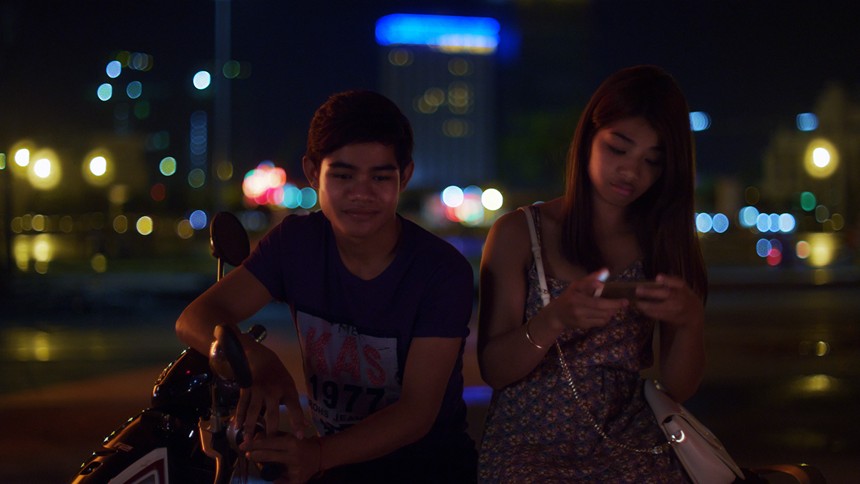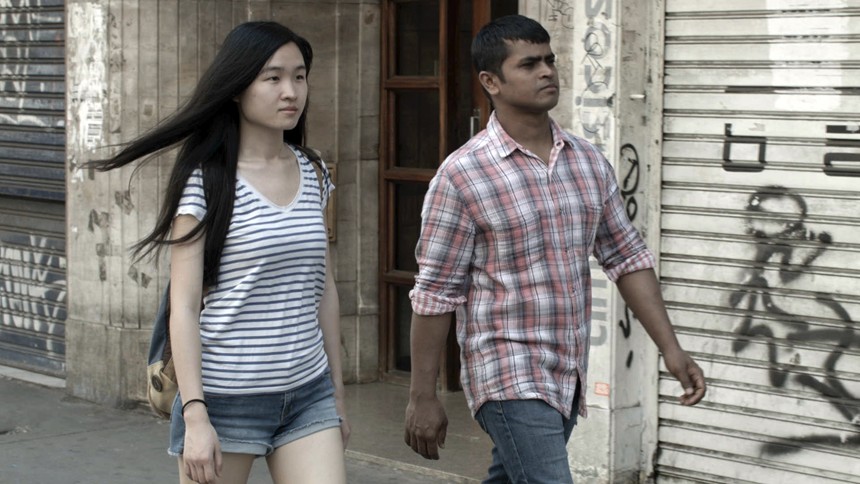New Directors/New Films 2017: 6 Must-See Selections
The 46th edition of the Film Society of Lincoln Center and Museum of Modern Art's New Directors/New Films Festival screens from March 15 through 26. As always, it's an eclectic international showcase of interesting new talents and approaches to cinematic expression.
In the gallery below are my picks of particular highlights of this year's selection. For more information, visit the festival's website.






PATTI CAKE$ (Geremy Jasper) *OPENING NIGHT FILM
This infectiously fun, rousing hip-hop tale from straight outta New Jersey overcomes its utterly predictable and overly familiar narrative arcs with its endless energy, brash brio, and the star-making central turn by Aussie emigre Danielle Macdonald as its title heroine.
Patricia Dombrowski, aka Killa P, aka Patti Cake$, save for her cultivated hip-hop lingo and swagger, could be a character out of a song by fellow Jersey native Bruce Springsteen (who is heard on the soundtrack, natch). She's counting on her dreams and her rhyme skills to get her out of her dead-end, wage slave existence in the middle of Garden State nowheresville. And she's determined not to let the fact that she's a plus-sized white girl (nicknamed "Dumbo" by neighborhood jerks) get in the way of her ambitions. However, there are mountains of obstacles in her way, not the least of which are her own mother (New York cabaret icon Bridget Everett), who drinks away most of the wages Patti brings home and bitterly mocks her daughter's life goals. But with the help of her pharmacist buddy Hareesh (Siddarth Dhananjay), a black death-metal rocker named Basterd (Mamoudou Athie), and her ailing grandma (Cathy Moriarty), Patti lays down some killer tracks that she hopes will launch her out of her hellhole.
Jasper, an erstwhile musician and music video director, puts the skills he learned at those other trades to fully effective use, injecting more than a little autobiography in his film and a keen empathy for the marginalized, downtrodden misfits mocked and disrespected by society. In this way, Jasper avoids making his film yet another indie coming-of-age movie cliche, and proves himself to be a filmmaker well worth watching in the future.
QUEST (Jonathan Olshefski)
The strongest and most affecting film I saw while previewing this festival was this true-life family saga, honoring the best qualities of observational documentary in covering nearly a decade in the life of the Raineys, a black family living in north Philadelphia. The timespan of the film covers all eight years of Obama's presidency, from the hopeful strains before Obama's election, to the more bitter and divisive times of the 2016 election.
In between, we follow the travails of Christopher "Quest" Rainey, his wife Christine'a "Ma Quest" Rainey, their daughter PJ, and Christine'a's son William (who has a son of his own). The shifting national political winds are referred to (mostly through TV news reports), but the film focuses much more closely on the daily lives and drama of the Raineys. They live in north Philly, a particularly violent section of the city, where gang shootouts on the streets are a normal occurrence. Without giving too much away, this street violence affects the Raineys in a direct way, leading to the most dramatic and poignant sections of the documentary.
Olshefski's patient and acutely sensitive stance yields great rewards, in subtly upending stereotypes and cliches about poor, broken black families. The Raineys, although they struggle financially, are a close-knit, loving family, priding themselves on being positive forces in the community: Christopher runs a recording studio in the neighborhood, while Christine'a works at a homeless shelter. Although a less truncated running time would have given the film's observational gifts even more room to fully flower, what we have is still mightily strong, fully achieving the deep, human empathy it strives for.
WULU (Daouda Coulibaly)
Ladji (Ibrahim Koma, in a fine leading turn) is a van driver looking to earn much more money than his low-wage, long-hours job affords him. He wants to earn this money not so much for himself, but to pull his sister Aminata (Inna Modja) out of prostitution. So he looks up an old drug dealer buddy of his who owes him favors; Ladji did time in jail for his friend's sake. Soon he's a full time drug courier, moving hashish and coke across various borders, and in increasingly dangerous situations. The soft-spoken Ladji finds he has a knack for this work, his quick thinking getting him out of some sticky situations. The ever more outlandish demands of Ladji's sister goad him into taking more risks and make him more willing to take more violent actions that previously weren't in his nature. Needless to say, things don't end well.
While this Mali-set thriller clearly delves in familiar tropes - not for nothing is it frequently described as a Malian Scarface - Wulu nevertheless impresses with its filmmaker's confidence and skill at creating compelling suspense and tension, while deftly relating it all to the political situation of its setting, leading up to the 2012 Mali civil war.
DIAMOND ISLAND (Davy Chou)
Just like Patti Cake$ and Wulu, in Chou's debut feature familiar narrative tropes - in this case that of the travails of restless, aimless youth - are transformed into transporting art by a unique sense of style. And in Diamond Island, this style is quite intoxicating, its near-psychedelic neon colors and the moody, drifting atmosphere making for an intensely mesmerizing experience.
The titular island is an actual construction site of luxury apartments and other properties off the coast of Phnom Penh, Cambodia, meant to attract investment from rich folk and bring the country fully into cutting edge modernity. However, as in other places where this sort of gaudy architecture is being constructed, wealth gaps are readily apparent. The workers tasked to build these properties are paid low wages and toil in often dangerous conditions, all to construct places they couldn't hope to afford to live.
The film follows one of these workers, Bora (Sobon Nuon), as he leaves his mother in the countryside to work on a building on Diamond Island, where he is introduced to an urban world of wealth and leisure far removed from what he has been used to up until now. Some dramatic points occur: finding his long lost brother Solei (Cheanick Nov), who'd left the family years before; feeling his first stirrings of love with lovely local girl Aza (Madeza Chhem). But this film is much more about feeling and mood than plot, and it derives its sense of naturalism with beautifully rendered details of how young people move, talk, and gaze at one another.
Chou's previous feature was Golden Slumbers, which concerned Cambodian film history destroyed by the Khmer Rouge. In Diamond Island, history is destroyed in a different way, not through genocide, but through capitalistic erasure of nature and culture. Chou, however, counteracts this with his vivid rendering of the beauty inherent of his character's essential goodness, and a vibrant spirit that refuses to be extinguished. Most of Cambodia's cinematic past may be gone forever, but Chou's lovely film lights a path toward a more artfully promising future.
THE FUTURE PERFECT (Nele Wohlatz)
Bressonian rigor meets playful language and culture-based humor in Wohlatz's beguiling, fleet-footed short feature. It's a mere 65 minutes in length, but this ingeniously clever documentary/fiction hybrid has much more to say about the immigrant and social outsider experience, and says it much more elegantly than most other works tackling this subject.
Its central figure, the charmingly winsome Xiaobin (Zhang Xiaobin, playing a character loosely based on herself) is a recent emigre to Buenos Aires from China. Unlike her parents, who run a laundromat and have little interest in interacting with the larger society, Xiaobin tries to learn Spanish and unlock the key of assimilation.
Wohlatz's clever conceit is to build the film's scenes and structure around language exercises, the sort of stiff, unnatural conversations and situations found in language books that have very limited utility in the real world. For Xiaobin, coming from a Mandarin language that doesn't use tenses, to Spanish, which has distinct grammar delineating past, present, and future, this opens up worlds of possibilities, especially, as the title indicates, alternate futures.
In much the same humorously deadpan manner as everything else that happens in the film, Xiaobin embarks on a romance with Vijay (Saroj Kumar Malik), a young Indian man she encounters at her job. It's necessarily a secret romance, as her parents would certainly not approve. Some of Xiaobin's imagined futures involve marrying him and dealing with her parents' discovery of her relationship. Truly original and unclassifiable, The Future Perfect touches on serious and profound subjects, but with a wit and lightness of touch that is wonderful to behold.
BY THE TIME IT GETS DARK (Anocha Suwichakornpong)
This lovely, crystalline, self-reflecting second feature by this remarkably talented Thai director gazes upon cinema, memory, performance, and historical trauma in a way that is initially challenging, but which proves to be quite seductive and entrancing. Built around a 1976 real-life massacre of student protesters by Thai government forces, the film travels freely back and forth in time, between "reality" and "fiction," in such a way as to call into question the labeling of such states. Scenes are replayed with different actors, a young woman appears in various servant guises (bathroom attendant, cook, monk), and stop-motion scenes of the natural world recur (often involving mushrooms, suggesting hallucinatory altered states). The ultimate meaning of all this remains elusive and difficult to pin down, but the delicate, gossamer beauty of Anocha's images is undeniable.

Around the Internet
Recent Posts
Leading Voices in Global Cinema
- Peter Martin, Dallas, Texas
- Managing Editor
- Andrew Mack, Toronto, Canada
- Editor, News
- Ard Vijn, Rotterdam, The Netherlands
- Editor, Europe
- Benjamin Umstead, Los Angeles, California
- Editor, U.S.
- J Hurtado, Dallas, Texas
- Editor, U.S.
- James Marsh, Hong Kong, China
- Editor, Asia
- Michele "Izzy" Galgana, New England
- Editor, U.S.
- Ryland Aldrich, Los Angeles, California
- Editor, Festivals
- Shelagh Rowan-Legg
- Editor, Canada


